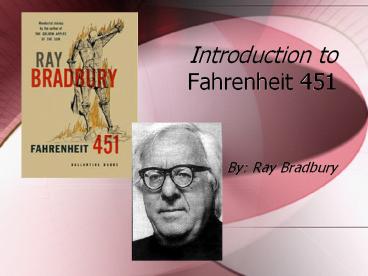Introduction to Fahrenheit 451 - PowerPoint PPT Presentation
Title:
Introduction to Fahrenheit 451
Description:
Title: DYSTOPIA: Author: Home Last modified by: Home Document presentation format: On-screen Show (4:3) Company: Tech Resources Other titles: Arial MS P ... – PowerPoint PPT presentation
Number of Views:333
Avg rating:3.0/5.0
Title: Introduction to Fahrenheit 451
1
Introduction to Fahrenheit 451
- By Ray Bradbury
2
DYSTOPIA
- The future through the eyes of fiction writers
3
What is a dystopia?
- Dys difficult, bad
- Topia place
- In practical terms, a dystopia is a vision of the
future that is bleak or dismal. It is also
usually a cautionary tale, a story that warns us
what could happen if certain trends continue.
4
Dystopian vs. Utopian Literature
- Utopian literature describes an ideal imaginary
world. The term comes from Thomas Mores Latin
work Utopia, written in 1516. - Dystopian literature paints the opposite of
the ideal world, a place that is highly
unpleasant.
5
What should be private and what should be public?
- One of the central questions of most dystopias is
how much power a government should have on its
citizens, and what results when people in power
abuse it or when the government becomes too
powerful.
6
Characteristics of dystopian fiction
- - majority set in future
- - generally considered a subgenre of science
fiction - - a war, revolution, uprising or other disaster
introduced early in narrative. - - lower and middle class often low standard of
living. - -upper class enjoy higher standard of living in
exchange for the loss of other qualities of life.
7
Cont.
- Over-controlling government
- A specific group that is outcast or oppressed
- At least one individual who questions the system
- An eventual attempt to revolt or overthrow the
government
8
What happens when government has no checks and
balances? When one person has all the power?
When rights are taken away for the purpose of
serving the greater good ?
9
Historical Context
- Written in the 1950s
- World War II (1939-1945) had just ended the US
had dropped the first atomic bombs on the
Japanese cities of Hiroshima and Nagasaki - Bradbury was influenced by the book burnings of
the Nazi regime in Germany during the 1930s
10
Cont.
- Political repression and dictatorship in Soviet
Union and fascist Spain even after World War II
when books were banned and intellectuals
persecuted. - By 1949, communism had spread to Eastern Europe
and China
11
Cont.
- After World War II, Europe US versus Soviet
Union in COLD WAR. The threat of nuclear war
increased. - By mid-1950s, nearly 60 of Americans were
members of the middle class - More to buy.
- Consumerism Success
12
- The electronics industry became the 5th largest
industry. Television had a widespread impact in
American homes - The US became an automobile culture in the
1950s.
13
- The increase in prosperity after the war led to
an increased passivity and conformity. Jobs were
plentiful and the common adage of the time period
was follow orders, you will succeed. (ie.
Montag at beginning).
14
- Published during McCarthyism era
- Sen. Joseph McCarthys hearings which
investigated spread of communism through
government infiltrators led to an atmosphere of
fear and distrust in the US.
15
- In the early years of filmmaking, censorship was
allowed on the grounds that movies were
entertainment and not an expression of free
speech. - Sen. McCarthys hearings into the political
background of artists led to the blackballing
of several prominent Hollywood writers during the
1950s
16
- In 1979, Bradbury discovered that his editors
had censored language in 75 separate sections of
Fahrenheit 451 without his knowledge or consent. - Students, reading the novel which, after all,
deals with censorship and book-burning in the
future, wrote to tell me of this exquisite irony.
17
- The novel focuses on two central themes
- IGNORANCE OF KNOWLEDGE
- CENSORSHIP
18
IGNORANCE OF KNOWLEDGE Bradbury focuses on the
importance of learning and how it impacts our
ability to make decisions. He believes that
without the ability to think about what were
doing, well be led to do wrong.
19
CENSORSHIP is the suppression of speech or
deletion of communicative material which may be
considered objectionable, harmful, sensitive, or
inconvenient to the government or media
organizations as determined by a
censor. (Wikipedia)
?Why would something be censored? ?What are the
dangers of censorship?
20
Can you think of some novels or movies
which would be good examples of dystopias? Make
a list.
21
Some of the most famous dystopias
- 1984 - George Orwells grim vision of Big Brother
and ultimate government control. - Fahrenheit 451 - Ray Bradburys vision of a world
where books and ideas are dangerous, and firemen
burn books instead of putting out fires. - Brave New World - Aldous Huxleys vision of a
world where genetics are manipulated and all
people stay within their own class. The
government is your parent! - A Clockwork Orange - Stanley Kubricks film about
the ultimate acceptance of violence in a society. - The Island - a film where clones are farmed as
spare parts for - real citizens.
- V for Vendetta - a film where the government has
surpressed all dissent and controls all aspects
of peoples lives.
22
Predict the Future
- Imagine what society will be like in 50 years?
- Brain storm some ideas and make a list.
- New types of technology?
- Homes? Jobs?
- Schools?
- Government?
- Leisure activities?
23
Dystopia in the MakingWhat if. . .
- No one had to go to school?
- You could have an iPod in your brain?
- Your computer could read your thoughts?
- No one had to pay taxes?
- Everyone had plastic surgery?
- Babies were scientifically created?































